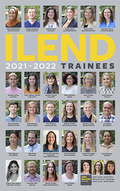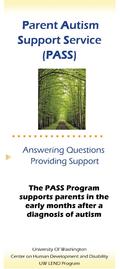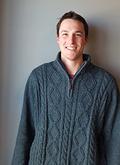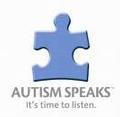Trainee Research
This call for papers is an opportunity for trainees within the AUCD network to share their research projects, leadership projects, or other program projects that they have been involved with during their traineeship. Trainees are asked to share research proposals, completed research projects, leadership projects, program evaluation projects, or program changes you have implemented in this call for papers. This is an opportunity to share your hard work with others, participate in scholarly activities, and generate discussion and ideas for future projects.
Read the Call for Papers below for specific guidelines and more information.
Trainee Papers 2007

Iowa LEND Trainees Explore the Intersection of Mental Health, Disability, and Incarceration
This year, 27 trainees completed the Iowa Leadership Education in Neurodevelopmental and Related Disabilities (Iowa LEND) program. Their graduation ceremony was held on May 5, two days after they had presented at the third annual virtual Iowa LEND Research Poster Symposium. As in previous years, the Symposium provided an impressive display of the talent, hard work and dedication of these emerging leaders.
Connecting Trainees on a State Level: California Maternal and Child Health Leadership Training Network
n article highlighting the California Maternal and Child Health Leadership Training Network (CAMCHLTN), a leadership project developed by the trainees of the California Leadership Education in Neurodevelopmental and Related Disabilities (CA-LEND) Training Program at USC University Center for Excellence in Developmental Disabilities, based at Children's Hospital Los Angeles and affiliated with the USC Keck School of Medicine

Former Trainee- Making A Difference in the Latinx Community
Recent Va-LEND graduate Fiorella Carrillo-Kimbrough volunteers with Caminos, a Richmond-based support group that works with Spanish-speaking families with children who have autism or other neurodevelopmental disabilities. The group incorporates the use of cultural brokers and provides culturally appropriate education and support.

Iowa LEND Trainees Begin the Year with a Poverty Simulation
What is it like to live without enough money to buy groceries for your family? Or pay for bus fare to get to the market? How do you find a job that provides a living wage? Or get to a job interview if you can't afford child care for your toddler? The new class of trainees from Iowa's LEND program encountered these issues and others, while participating in a poverty simulation to launch their training year.

Active Leadership in the Tucson Community (Arizona LEND)
What a bittersweet end to a fantastic traineeship for the University of Arizona LEND cohort! Over the past nine months, Arizona LEND has been involved in some great Leadership Projects designed to step outside of their comfort zones and serve people with disabilities and complex medical needs in Tucson. From neighborhood playgrounds to customized websites, the trainees in this cohort came together to make the most of their skill sets. Here are some of the highlights.

LEND Audiology Trainees Learn Strategies for Early Diagnosis at EHDI 2019
The 18th annual Early Hearing Detection and Intervention (EHDI) Meeting welcomed nearly 1,000 diverse stakeholders on March 4-6 in Chicago, IL. The EHDI Meeting brings together those who work in state-based EHDI Programs, assist in EHDI efforts on the federal level, provide screening, diagnostic, and early intervention support at the state level to young children who are deaf and hard of hearing and their families, and deaf and family advocates. The Meeting is organized by the American Academy of Pediatrics, Hands and Voices, U.S. Department of Health and Human Services: Health Resources and Services Administration, and National Center for Hearing Assessment & Management at Utah State University.

Vanderbilt Kennedy Center's (IDDRC, UCEDD, LEND) LEND Self-advocate Trainees Learn from and Demonstrate the Benefits of Inclusive Environments
Author: Courtney Taylor
The definition and purpose of disability inclusion is to be sure that everyone has the same opportunities to participate in every aspect of life to the best of their abilities and desires. In the 2018-19 academic year, the Vanderbilt Kennedy Center (IDDRC, UCEDD, LEND) Consortium LEND (VCL) Training Program through the Vanderbilt Kennedy Center welcomed two self-advocates to their cohort of trainees for the first time.

SC LEND Trainees Attend the Nurturing Developing Minds Conference
The members of the South Carolina LEND program recently attended a state conference in March 2019 focusing on research and initiatives that are driven to create supportive environments to help children and their families flourish. The Nurturing Developing Minds conference provided several opportunities to the LEND trainees, including attending reviews of recent research and policies on developmental surveillance and screening (with a particular emphasis on the Help Me Grow nationwide initiative) and on the long-term risks of spanking and promising interventions (i.e., the No Hit Zone)

The Center for Diversity in Public Health Leadership Training at Kennedy Krieger 2019 Center Activities (MD UCEDD/LEND)
The Center for Diversity in Public Health Leadership Training at Kennedy Krieger Institute provides innovative and real-world experiential learning for diverse undergraduate, post-baccalaureate and graduate school scholars interested in maternal and child, public health, and eliminating health disparities.

LEND Fellows Past and Present Lead Multicultural Autism Action Network
Maren Christenson Hofer joined the MNLEND Fellowship cohort this 2018-2019 year. As the parent of an autistic child, she is keenly aware of challenges faced by families trying to navigate educational, medical, therapeutic, and other support and service systems to ensure that their autistic children's needs are met. Maren currently serves as a leader in the Multicultural Autism Action Network (MAAN), a non-profit organization built on the idea that navigating autism support and service systems can be incredibly complex for families, and even more overwhelming when differences in culture, language, and power dynamics are at play. Two additional MNLEND Fellow-Alumni are engaged in supporting MAAN's work: Mariam Egal (Minnesota Dept. of Health Coordinator) and Fatima Molas (respiratory therapist; parent-advocate). Another MAAN member, Dr. Delia Samuel, has served as guest faculty for MNLEND.

The Louisiana Autism Spectrum and Related Disabilities (LASARD) Project supports school districts across the state by providing training and coaching in evidence-based practices for students with ASD
The Louisiana Autism Spectrum and Related Disabilities (LASARD) Project has been a partnership between the LSUHSC Human Development Center and the Louisiana Department of Education since 2006. The overall purpose of LASARD is to improve outcomes for students with autism spectrum disorder (ASD) and related disabilities by developing a pool of highly effective educators across the state.

The Parent Autism Support Service (PASS) at the University of WA LEND: A unique model of care coordination for families of children diagnosed with autism
The Parent Autism Support Service (PASS) at the University of Washington Leadership Education in Neurodevelopmental and Related Disabilities (UW LEND) is a program to support parents in the early months after a diagnosis of autism. The PASS Program is run by the Family Leadership Discipline of the UW LEND program. This program serves children seen in the Child Development Clinic at the University of Washington Center on Human Development and Disability.

2016-17 MNLEND Fellow Publishes!
Jack Reagan, current 2016-17 MNLEND Fellow recently co-published a brief based on the FINDS 2010 data surveying family caregivers. The data he analyzed within the FINDS survey focused on the emotional and physical markers affecting family caregivers. These markers have both positive and negative association to their related outcomes for family caregivers.

MNLEND Alumna Publishes!
Last year, I was very fortunate to be a LEND Fellow at the University of Minnesota. I applied because I was embarking on my PhD dissertation in nursing and wanted to explore the experience of families of children who lived with severe autism. The LEND experience not only provided an in-depth education in neurodevelopmental disorders, but also the LEND staff helped me access families who would ultimately participate in my research. This research ultimately changed the way I understand families who live with a severe chronic condition such as severe autism.

Ohio's LEND Trainees Showcase Their Research at the UC UCEDD-Nisonger Poster Symposium
In the entire state of Ohio, there are 39 trainees enrolled in the LEND program. The program culminates with an annual poster symposium featuring the trainees' research projects. This year, Cincinnati Children's Hospital Medical Center had the honor of hosting the event.

Autism Speaks Launches Transition Tool Kit, Providing Practical Information and Resources to Guide the Transition to Adulthood
NEW YORK, N.Y. (FEBRUARY 3, 2011) In an effort to help families and their adolescents with autism more smoothly navigate the challenging transition into adulthood, Autism Speaks, North America's largest autism science and advocacy organization, today launched the Autism Speaks Transition Tool Kit, a unique guide and roadmap to help families on the journey from adolescence to adult life. The free Tool Kit, developed in conjunction with both parents and professionals, features a wealth of practical and actionable information, as well as links to valuable resources.
Exploring and Stretching the Boundaries of Brain Imaging
University of Washington researchers are exploring new brain imaging techniques that someday may enable clinicians to better understand and treat patients suffering from such conditions as stroke, epilepsy, Alzheimer's disease and other forms of dementia. "We are trying to develop imaging biomarkers of prognosis and responsiveness to treatment. This may enable us to predict whether or not people will respond to treatment," said Thomas Grabowski, Jr., M.D., director of the Integrated Brain Imaging Center (IBIC) and a research affiliate of the Center on Human Development and Disability (CHDD).
AUCD/Easter Seals Project ACTION Sponsored Project: Transportation for People with Disabilities
University of Pittsburgh (LEND) Fellow Investigates Maternal Distress & Problem-Solving Skills of Newly Diagnosed Cancer Cases: Implications for Culturally-Competent Care
Trainee Research Paper: Catherine Haarstad, URLEND
Supporting Children with Parents Have Cognitive Challenges: Needs Assessment Results from Specialized Clinics in Utah
Trainee Research Paper: Dorit Radnai-Griffin, Delaware UCEDD
Infants/Toddlers Assessment Tool (ITAT)
Trainee Research Paper: Erin Bastien, Delaware UCEDD
The LEAD Project (Leadership, Employment, Advocacy, Development) for Youth and Emerging Leaders with Developmental Disabilities
Trainee Research Paper: Julie Pelletier & George Wootton, URLEND
Transition of Young Adults in Special Education to Post High School Life
Trainee Research Paper: Lauren Francis, Delaware UCEDD
New Directions Early Head Start Program Wide Self Assessment
Trainee Research Paper: Rene Jamison, KUMC
The Effects of Parent-Child Interaction Therapy (PCIT) on Problem Behaviors in Three Children with Autistic Disorder







